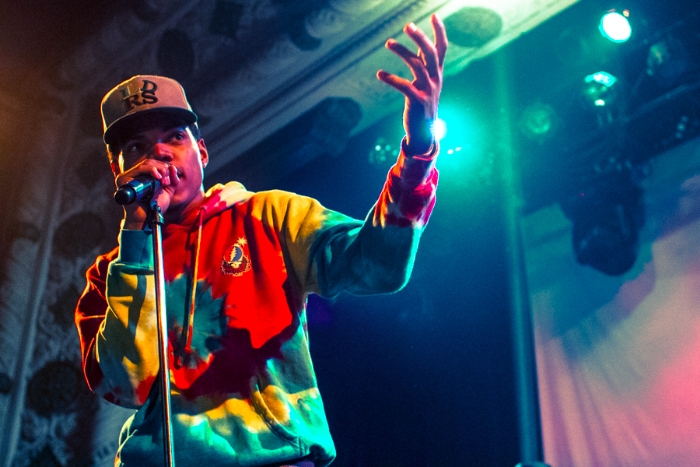
By JAMES SCALIA
Chance the Rapper stole the stage during the 59th Annual Grammy Awards when he snagged three awards including Best New Artist and Best Rap Album of the year. While he not only helped shape and merge gospel music and rap, “Chance” found success without even selling a song. That’s right. Three Grammy’s and zero songs sold.
It’s clear that Chance has influenced music and its industry at only 23 years old, but he comes from humble beginnings. Born on April 16th, 1993, Chancelor Bennett grew up in Chicago, Illinois. His father was an aide to the mayor in Chicago and also worked for Barack Obama when he was a senator in Illinois.
Bennett was a troubled high school student. His teachers doubted he could reach his dreams of becoming a rapper. While serving a 10-day suspension, Bennett created his first mixtape, humorously titled “10 day,” according to GQ. After his first mixtape release, Bennett began to pick up popularity in Chicago, and was soon featured on Donald Glover’s (also known as Childish Gambino) 2012 mixtape “Royalty.”
Journey to the Limelight

This propelled Bennett to produce his second mixtape called “Acid Rap” in 2013. Although it didn’t achieve extreme national success, the mixtape caught the attention of a couple other well-known musical artists, including Kanye West.
West was so impressed with Bennett’s musical talent and potential, he decided to feature him on his album “The Life of Pablo.” Chance rapped on the most critically-acclaimed song on the album “Ultralight Beam.” He also helped co-write “Waves”, “Father Stretch My Hands Pt.1”, “Famous” and “Feedback.” His appearance and work on Kanye’s album made him a sensation, which in turn built hype for his next mixtape.
Chance released “Coloring Book” on May 12, 2016 and featured artists such as Kanye West, Lil Wayne, Justin Bieber and Future. It achieved a great deal of commercial success while appearing at No. 8 on the Billboard 200. He produced his first music videos off of songs such as “No Problem” and “Same Drugs.” Bennett also released his music on Apple Music, continuing his streak of not signing with a record label and/or selling a song. Bennett has truly invented a new way to be a successful musical artist, and his fans appreciate his generosity towards anyone that wants to acquire his music.
Chance’s Appeal
“In a way, he’s revolutionizing the music industry from a business perspective,” said Seton Hall sophomore student Austin Roberts. “I think it will influence more artists to follow his lead and change the way artists earn their money while making their music more accessible to people.”

Chance also references his unique methods in a few of his songs. In “Blessings,” he raps, “I don’t make songs for free, I make them for freedom.”
He also hints that there will be “problems” if any record labels try to stop him in his song “No Problem.” Another appealing aspect of Bennett is the appreciation he shows to his fanbase, since they fuel his financial success through only two incomes: merchandise and live performances.
“He’s so unique. The first time I listened to him I realized how different he was: from his flow and his rhyme scheme compared to other artists,” NJIT sophomore student Ahmad Saleh said. “I’ve been drawn to him ever since.”
Chance is set to go on tour on April 24 and perform “Coloring Book” across the nation as he continues to climb the hierarchy rankings of the rap community.
What I’d like to know more about is why Chance doesn’t sell his songs. Is there a bigger background behind this influential decision? And what do other rap artists who make millions off of their songs have to say about his decision? Also in general, how much does Chance make if he doesn’t sell songs -a little or still a lot- and does that affect his life?
How many categories was Chance nominated overall this year and in general?